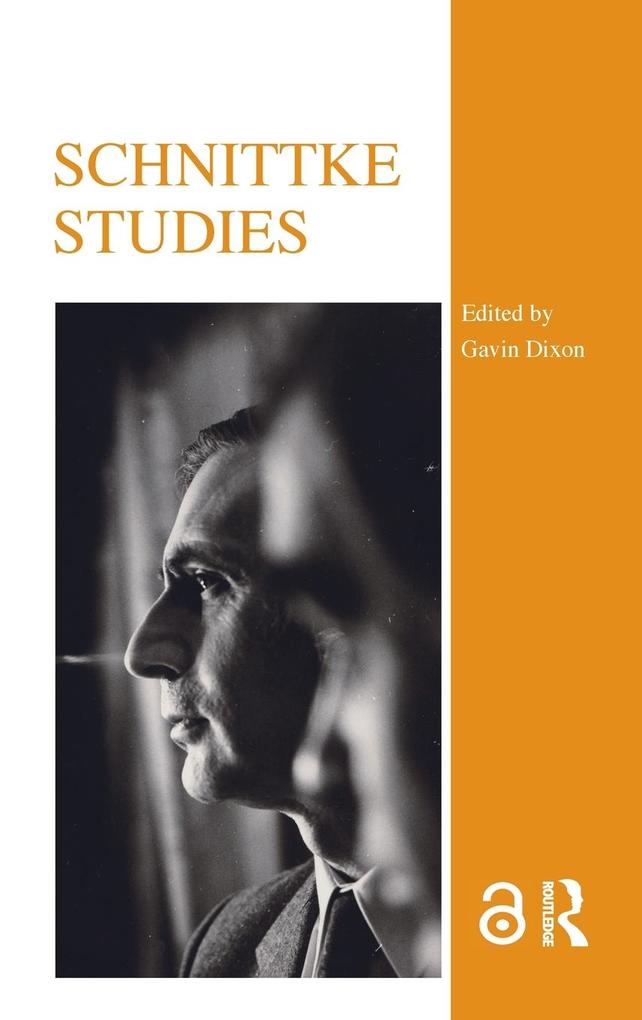
Zustellung: Mo, 23.06. - Do, 26.06.
Versand in 1-2 Wochen
VersandkostenfreiBestellen & in Filiale abholen:
Alfred Schnittke (1934-1998) was arguably the most important Russian composer since Shostakovich, and his music has generated a great deal of academic interest in the years since his death. Schnittke Studies provides a variety of perspectives on the composer and his music. The field is currently diverse and vibrant, and this book demonstrates the range of academic approaches being applied to Schnittke's work and the insights they provide, covering: polystylism, for which Schnittke is best known, the significance of the composer's Christian faith, and detailed formal analyses of key works, with connections drawn between the apparently divergent periods of the composer's career.
Inhaltsverzeichnis
Contents
Preface - Gavin Dixon
PART I - INTERPRETATIVE STUDIES
Chapter 1 'Crucifixus Etiam Pro Nobis': Representations of the Cross in Alfred Schnittke's Symphony No. 2 'St. Florian' - Ivan Medi
Chapter 2 Alfred Schnittke and the Znamennyi Raspev - Emilia Ismael-Simental
Chapter 3 Negative Spirituality and the Inversion of Christianity as Media of Social Criticism in Alfred Schnittke's Opera Life with an Idiot - Amrei Flechsig
Chapter 4 Polystylism as Dialogue: Interpreting Schnittke through Bakhtin - Gavin Dixon
PART II - THEORETICAL STUDIES
Chapter 5 Schnittke's Polystylistic Schemata: Textural Progression in the Concerti grossi - Gordon E. Marsh
Chapter 6 Symmetrical Constructions in the Fourth Movement of Alfred Schnittke's String Quartet No. 4 - Aaminah Durrani
PART III - RUSSIAN PERSPECTIVES
Chapter 7 'Faith through Scepticism': Desacralisation and Resacralisation in Schnittke's First Symphony - Victoria Adamenko
Chapter 8 On the Late Style of Alfred Schnittke (The Instrumental Works) - Evgeniia Chigareva
Chapter 9 The Schnittke Code - Alexander Ivashkin
APPENDIX Revised Catalogue of Alfred Schnittke's Sketches in the Juilliard Manuscript Collection - Ivana Medi
Preface - Gavin Dixon
PART I - INTERPRETATIVE STUDIES
Chapter 1 'Crucifixus Etiam Pro Nobis': Representations of the Cross in Alfred Schnittke's Symphony No. 2 'St. Florian' - Ivan Medi
Chapter 2 Alfred Schnittke and the Znamennyi Raspev - Emilia Ismael-Simental
Chapter 3 Negative Spirituality and the Inversion of Christianity as Media of Social Criticism in Alfred Schnittke's Opera Life with an Idiot - Amrei Flechsig
Chapter 4 Polystylism as Dialogue: Interpreting Schnittke through Bakhtin - Gavin Dixon
PART II - THEORETICAL STUDIES
Chapter 5 Schnittke's Polystylistic Schemata: Textural Progression in the Concerti grossi - Gordon E. Marsh
Chapter 6 Symmetrical Constructions in the Fourth Movement of Alfred Schnittke's String Quartet No. 4 - Aaminah Durrani
PART III - RUSSIAN PERSPECTIVES
Chapter 7 'Faith through Scepticism': Desacralisation and Resacralisation in Schnittke's First Symphony - Victoria Adamenko
Chapter 8 On the Late Style of Alfred Schnittke (The Instrumental Works) - Evgeniia Chigareva
Chapter 9 The Schnittke Code - Alexander Ivashkin
APPENDIX Revised Catalogue of Alfred Schnittke's Sketches in the Juilliard Manuscript Collection - Ivana Medi
Produktdetails
Erscheinungsdatum
17. November 2016
Sprache
englisch
Seitenanzahl
302
Herausgegeben von
Gavin Dixon
Verlag/Hersteller
Produktart
gebunden
Gewicht
619 g
Größe (L/B/H)
240/161/21 mm
ISBN
9781472471055
Entdecken Sie mehr
Bewertungen
0 Bewertungen
Es wurden noch keine Bewertungen abgegeben. Schreiben Sie die erste Bewertung zu "Schnittke Studies" und helfen Sie damit anderen bei der Kaufentscheidung.









